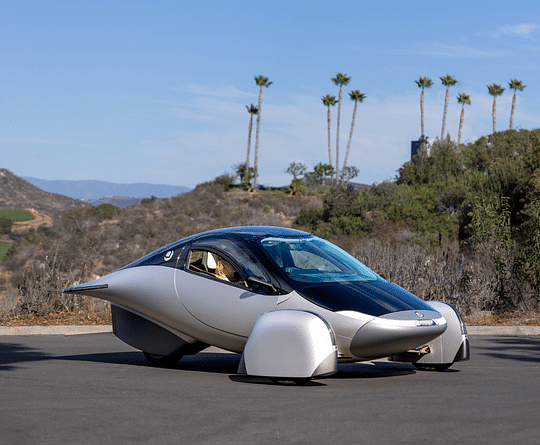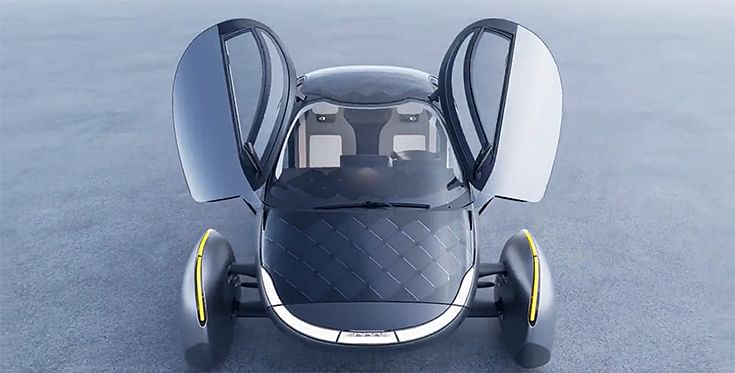Aptera gets California Energy Commission’s $21m grant to produce solar EVs
California state to help accelerate mass production of two-seat, three-wheeled solar car which can travel up to 64km a day on free power from its integrated solar panels.
San Diego-based Aptera Motors has been approved for a $21 million (Rs 174 crore) grant from the California Energy Commission (CEC) to add critical capacity to accelerate scaled manufacturing of the Aptera zero emission vehicle (ZEV).
Aptera is a two-seat, ultra-efficient solar EV, leveraging embedded solar panel power for up to 40 miles / 64 kilometres of grid-free daily driving, with the additional capacity for plug-in charging and a range of up to 1,000 miles / 1,600km. It is the first of many solar mobility products Aptera plans to offer.
Aptera’s Solar Mobility Manufacturing Project, supported by the CEC, will scale up and speedily bring to mass market the Aptera vehicle and component manufacturing in California, reducing substantial levels of cumulative greenhouse gases (GHG). As scale is reached, the company plans to onshore an innovative, specialised in-wheel Aptera motor manufacturing line to California from Europe.
Aptera’s co-CEO Chris Anthony said, “Working with the CEC enables us to produce grid-free, carbon-neutral solar mobility, while creating new jobs for all Californians. Our over-arching goal is to meet the demand for our solar electric vehicles to have real impact on climate change, sharing in CEC’s ultimate mission.”
"Aptera represents California's innovative and entrepreneurial spirit when it comes to electric vehicles, harnessing the power of the sun to go further on truly zero-emission solar energy,” said CEC Commissioner Patty Monahan. “The Energy Commission is proud to fund Aptera to manufacture the world's first mass-produced, three-wheeled solar car. Meeting California's goal to zero out pollution from transportation over the next 15-25 years will require innovation and thinking outside the box."
 Aptera Motors claims its solar EVs are the world’s most technologically advanced, made possible by breakthroughs in battery efficiency, aerodynamics, material science and manufacturing.
Aptera Motors claims its solar EVs are the world’s most technologically advanced, made possible by breakthroughs in battery efficiency, aerodynamics, material science and manufacturing.
Superior Aptera performance stems from innovations beyond integrated solar panels: an aerodynamic shape, stronger materials, lighter weight, fewer parts, ease of manufacture, and in-wheel motors. These elements combined create an efficient and safe vehicle. Producible at mass scale, the EV OEM claims Aptera will ultimately result in remarkable GHG and criteria pollutant reductions.
As a Zero Emissions Vehicle (ZEV), Aptera produces no tailpipe pollution. However, Aptera is even cleaner than typical ZEVs because electricity for other ZEVs needs to be generated somehow — often from hydrocarbons or coal. Aptera is a true ZEV, making its own fuel for driving up to 40 miles / 64km per day: in this way it can outperform all other vehicles in decreasing GHG and criteria pollutant emissions.
Harnessing the power of the sun

The two-seat, ultra-efficient solar EV leverages embedded solar panel power for up to 64km of grid free daily driving, with the additional capacity for plug-in charging and a range of up to 1,000 miles / 1,600km.
When Aptera does charge from the grid, it goes much further for the same amount of electricity as other vehicles, due to its ultra-efficient design that delivers more than twice the MPGe and lower GHG emissions compared to other ZEVs.
When drivers with commutes of less than 40 miles / 64km a day leverage the full benefit of the electricity generated by on-board solar, Aptera becomes carbon-neutral and generates 0g of CO2e/mi and 0g of NOx and VOC criteria pollutants.
In addition, one of the Aptera’s key goals for the project is to attract and employ new members of Aptera’s workforce from underserved communities including regional Indian tribes. Aptera will also be partnering with local community colleges to train and recruit new employees.
The $21 million grant from the California Energy Commission is part of the state's ongoing effort to promote clean energy and reduce greenhouse gas emissions. CEC is leading the state to a 100% clean energy future. It has seven core responsibilities: developing renewable energy, transforming transportation, increasing energy efficiency, investing in energy innovation, advancing state energy policy, certifying thermal power plants, and preparing for energy emergencies.
Images: Aptera Motors/Twitter
RELATED ARTICLES
Autoliv Plans JV for Advanced Safety Electronics With China’s HSAE
The new joint venture, which is to be located strategically near Shanghai and close to several existing Autoliv sites in...
JLR to Restart Production Over a Month After September Hacking
Manufacturing operations at the Tata Group-owned British luxury car and SUV manufacturer were shut down following a cybe...
BYD UK Sales Jump 880% in September to 11,271 units
Sales record sets the UK apart as the largest international market for BYD outside of China for the first time. The Seal...






 By Autocar Professional Bureau
By Autocar Professional Bureau
 14 Mar 2023
14 Mar 2023
 4927 Views
4927 Views










 Ajit Dalvi
Ajit Dalvi




